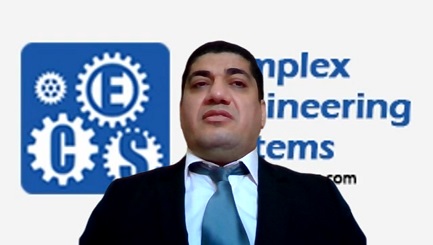Complex Engineering Systems
It is a great pleasure and honor for me to be involved as the Editor-in-Chief and founder of the new journal of Complex Engineering Systems. On behalf of the publisher, associate editors, reviewers and authors of the journal, The mathematical and engineering research communities such as electrical engineering, mechanical engineering, chemical engineering, biomedical engineering, pure/applied mathematics, for instance, are kindly invited to share their latest research results through this platform.
Complex engineering systems are generally represented in terms of a set of interconnected systems whose collective/global behaviors/properties are somewhat difficult to be predicted or managed. The context of complex engineering systems is mainly concerned with developing multi-component engineering systems, designs, or algorithms to exploit those unpredictable collective/global behaviors/properties. Complexity in engineering systems is in general manifested in component, product, system, interconnections of interacting subsystems or multidisciplinary system designs. In a broad sense, complexity is related to the expected amount of information that may be needed to describe a dynamical system.
Considering that open access publication is an excellent opportunity for increasing visibility of the research results transparently, Complex Engineering Systems, launched with a well-established publisher, is aiming to provide a high-level platform for researchers and practitioners to disseminate their theoretical- or engineering-oriented research output achievements within the context of complex engineering systems that fosters knowledge sharing in different branches of engineering discipline. Complex Engineering Systems also publishes novel theoretical methods, algorithms, simulations, experiments, and case studies as applications of state-of-the-art research in complex engineering systems.
The journal will publish different types of manuscripts such as Original Research Article, Review, Technical Note, Editorial, Commentary, Perspective and special issues organized by qualified scientists in their expertise areas. The authors are encouraged to provide their results in detail, which can be helpful to reproducing the obtained results by potential readers. Therefore, there is no restriction on the length of an article. In evaluation of the submissions, there is a rigorous peer-review process implemented in the structure of the journal operation including Pre-check, Publishing Ethics, and Peer Review. In most cases, this is a single-blind assessment with at least two independent reviewers, followed by an editorial decision by our highly experienced Editorial Board members before making the final decision by the Editor-in-Chief. To deeply appreciate the reviewers, outstanding reviewers are selected based on their kindly effort and performance in evaluation of the submissions and announced in the journal webpage annually.
The scope of Complex Engineering Systems includes, but is not limited to System theory, Control systems, System uncertainty, Complex networks, Cyber-physical systems, Quantum dynamical systems, Computational complexity, Cyber security and attacks, Complex Chemical Processes, Optimization algorithms, Fault diagnosis and prognosis, Data management and processing, Information fusion, Artificial intelligence and Machine learning, Electrical, Mechanical or Hydraulic engineering systems, Mechatronics, Agriculture engineering systems, Automotive systems, Aerospace systems, Robotics, Smart grids, Smart manufacturing, Intelligent transportation systems, Socio-technical systems, Biological systems, and Health care systems engineering. I encourage you to submit your original research results to the Complex Engineering Systems by following the Instructions for Authors available at the journal webpage. Our intention is to notify the authors of first decisions on their submission within four to eight weeks after the submission date and this can be recognized as one of our strategies to provide the authors with a forum for rapid publications subject to a rapid review process.
Finally, I would like to thank our journal manager and Associate Editor members for their great efforts to the journal development. I have a pleasure to work with them in the structure of the journal and special thanks go to the authors for contributing to the success of the journal through their quality submissions and to the reviewers for carefully checking the quality of submissions, which obviously increases the quality of the journal. Once again, we are looking forward to receiving your submissions.
DECLARATIONS
Authors’ contributionsThe author contributed solely to the article.
Availability of data and materialNot applicable.
Financial support and sponsorshipNone.
Conflicts of interestThe author declared that there are no conflicts of interest.
Ethical approval and consent to participateNot applicable.
Consent for publicationNot applicable.
Copyright© The Author(s) 2021.
How to Cite
Download Citation
Export Citation File:
Type of Import
Tips on Downloading Citation
Citation Manager File Format
Type of Import
Direct Import: When the Direct Import option is selected (the default state), a dialogue box will give you the option to Save or Open the downloaded citation data. Choosing Open will either launch your citation manager or give you a choice of applications with which to use the metadata. The Save option saves the file locally for later use.
Indirect Import: When the Indirect Import option is selected, the metadata is displayed and may be copied and pasted as needed.


















Comments
Comments must be written in English. Spam, offensive content, impersonation, and private information will not be permitted. If any comment is reported and identified as inappropriate content by OAE staff, the comment will be removed without notice. If you have any queries or need any help, please contact us at [email protected].